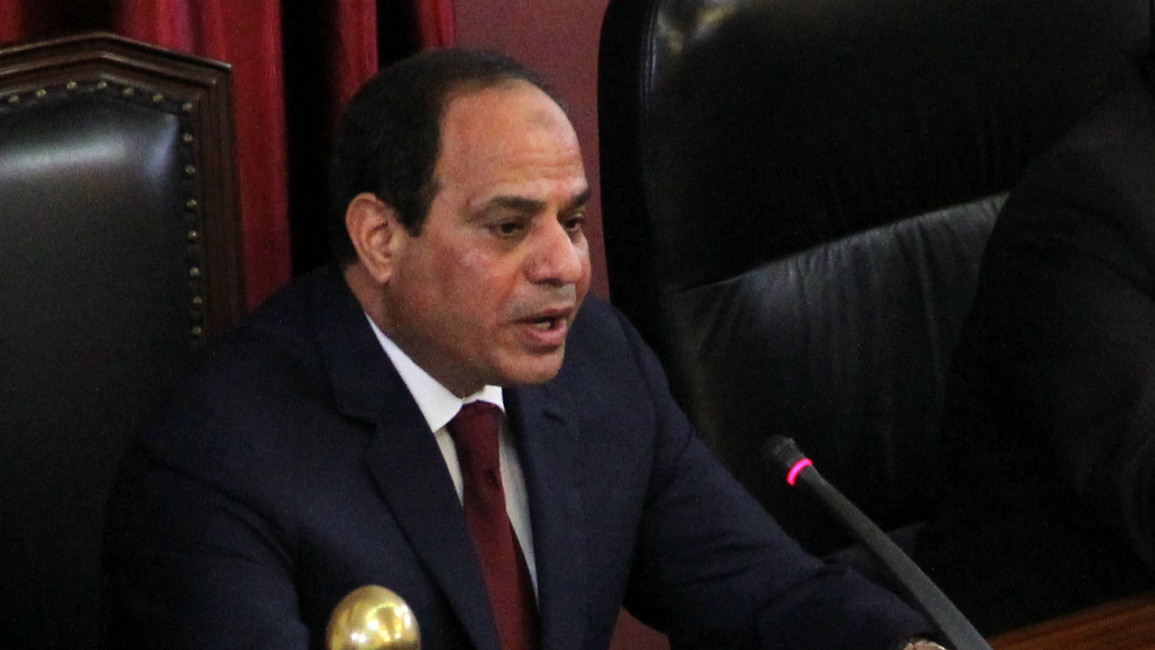
Fighting for the right to criticise in Sisi's Egypt
There has been a surprising increase of public criticism of the Egyptian president, Abdel Fatah el-Sisi, and his record in office recently.
Some journalists have defended their right to criticise Sisi and his government to get them to improve and to expose their mistakes. They say they don't want a new "pharaoh" to emerge and repeat the mistakes of those before him.
On the other hand, one still finds journalists who defend Sisi no matter what. And as usual, they invoke foreign conspiracies, hidden hands, and fifth columns in his defence.
Without a doubt, anyone should be able to criticise Sisi without fear of the consequences.
| Criticizing Sisi is essential for stopping the disasters he is causing or at the very least, trying to limit their damage. |
Criticizing Sisi, who has indeed started turning into a new pharaoh, is essential for stopping the disasters he is causing or at the very least, trying to limit their damage. The new pharaoh does not want to hear any criticism, or even the most timid advice.
But if so, then why did some reckon that recent criticism of Sisi in Egypt is strange or part of a conspiracy?
One reason is that, this time, the criticism is not coming from dissidents, the Muslim Brotherhood, revolutionary youths, or even human rights activists and academics.
This time, it is coming from journalists who were themselves among the strongest supporters of and propagandists for Sisi until recently.
Some of these even supported the brutal repression, the anti-protest law, the imprisonment of protestors, and all the other measures that allowed Sisi to become this new pharaoh.
So have their consciences suddenly awakened? Have they finally felt guilty for what they have done, and now want to save what can still be saved? I don't know, but I don't think so.
On the other hand, there have been articles railing against businessmen who own certain television networks. Some suggested there are disputes between these owners and Sisi, emerging after they refused to donate to the Long Live Egypt Fund.
However, there are journalists who still defend him vehemently - who happen work in networks and publications owned by these businessmen, with personal and commercial interests connected with the regime since the Mubarak era.
With Hosni Mubarak returning to the public eye once again, there is talk suggesting that Sisi's role is over and that he has done enough. Some media figures now publicly claim they were the ones behind the 30 June romoval of Morsi and Sisi's rise.
Is support for Sisi finally ebbing?
| Sisi is no longer in need of the services of so-called political parties and civil forces. Now, he can rely directly on his populism. |
So are there really cracks emerging in the alliance between the army and the fulul, the holdovers of the Mubarak regime, as happened before with the 3 July alliance? Recall that this alliance, which has since collapsed, consisted of the military, the fulul, and a number of failed political parties that claimed to be secular or liberal.
Sisi is no longer in need of the services of so-called political parties and civil forces as such, after he took power, no matter how much support and sycophancy they show. Now, he can rely directly on his populism.
I do not believe any claim without compelling evidence or adequate analysis, especially as the most common phrases in Egypt, much to my annoyance, are phrases like "it is said" and "I heard that..."
For this reason, I believe the claim about a split between the military, the businessmen, and the fulul are hypothetical and yet to be proven.
I do not care much if this claim is true or exaggerated, because there isn't a lot of difference between the military and the Mubarak regime. Both are corrupt and tyrannical. Both have imprisoned thousands of young people and innocents. Both have the same facade, the same ideas, the same orientations, and the same biases. And both are failures who are destroying Egypt.
We do not know whether what is happening is a real split in preparation for the next presidential election, or a conflict of interests between the businessmen of the Mubarak regime and the businessmen of the military establishment.
Let us wait and see. What else is there to do but wait.
Opinions expressed in this article remain those of the author and do not necessarily reflect the opinions of al-Araby al-Jadeed, its editorial board or staff.
This is an edited translation from our Arabic website.




